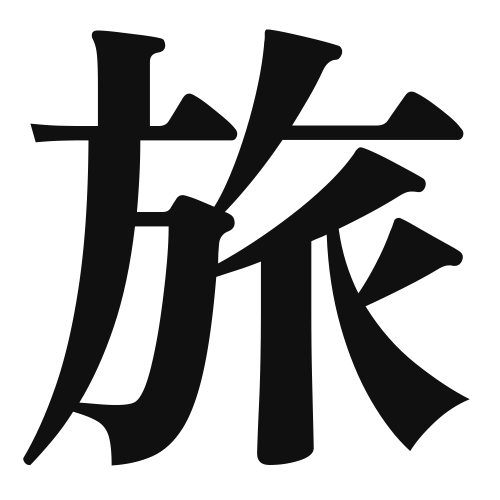1. Overview of Meaning
The kanji “旅” (tabi) means “journey” or “travel.” It represents the act of moving from one place to another, often for exploration or adventure.
2. Formation and Radicals
Formation of the Kanji: The kanji “旅” is a combination of two components: the radical “走” (hashiru), which means “to run,” and “夭” (you), which is associated with youth or vitality. This combination suggests the idea of moving swiftly and energetically during a journey.
Radical: The radical of “旅” is “走” (hashiru), indicating movement or action.
3. Examples of Usage
Common Words and Phrases:
- 旅行 (ryokou) – travel, trip
- 旅館 (ryokan) – traditional Japanese inn
Example Sentences in Daily Conversation:
- 今度の週末に旅行に行きます。 (Kondo no shuumatsu ni ryokou ni ikimasu.) – I will go on a trip this weekend.
- 旅館に泊まるのが楽しみです。 (Ryokan ni tomaru no ga tanoshimi desu.) – I am looking forward to staying at a ryokan.
4. Synonyms and Antonyms
Similar Kanji:
- 行 (kou) – to go, which emphasizes the action of moving but does not specifically imply travel.
- 移 (i) – to move, which can refer to changing location but is broader than “旅.”
Antonyms:
- 留 (ryuu) – to stay, which indicates remaining in one place rather than traveling.
5. Cultural and Historical Background
Connection to Japanese Culture: Travel has been an essential part of Japanese culture, with historical routes like the Tokaido connecting major cities. The concept of “tabi” is deeply embedded in traditional practices, such as pilgrimages to sacred sites.
Proverbs and Idioms:
- 旅は道連れ世は情け (Tabi wa michizure yo wa nasake) – “Traveling companions make the journey enjoyable; kindness is essential in life.” This proverb emphasizes the importance of companionship and kindness during travels.
